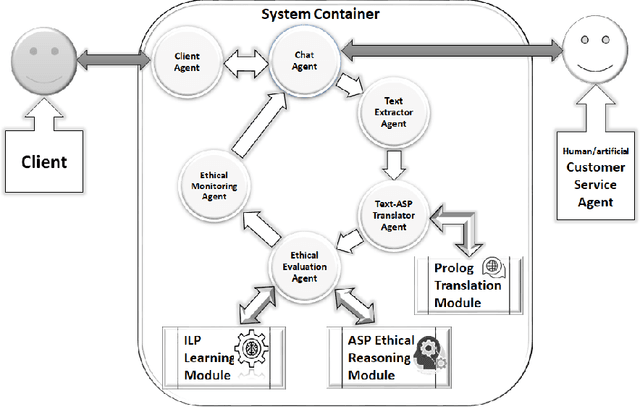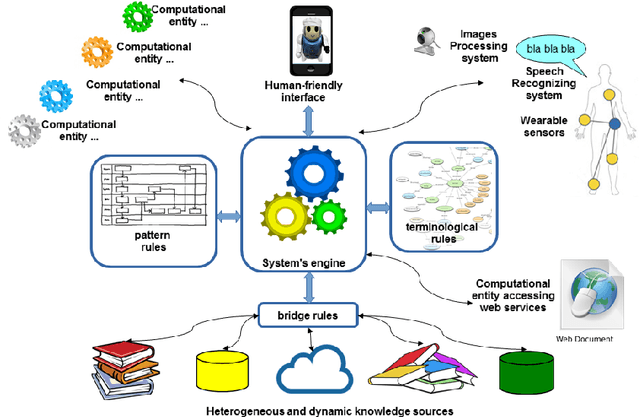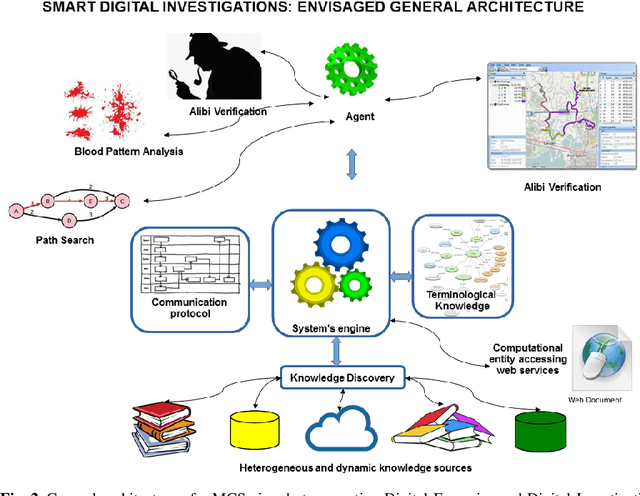Stefania Costantini
University of L'Aquila
An ASP-based Solution to the Medical Appointment Scheduling Problem
Jan 07, 2026Abstract:This paper presents an Answer Set Programming (ASP)-based framework for medical appointment scheduling, aimed at improving efficiency, reducing administrative overhead, and enhancing patient-centered care. The framework personalizes scheduling for vulnerable populations by integrating Blueprint Personas. It ensures real-time availability updates, conflict-free assignments, and seamless interoperability with existing healthcare platforms by centralizing planning operations within an ASP logic model.
* In Proceedings ICLP 2025, arXiv:2601.00047
Ensuring trustworthy and ethical behaviour in intelligent logical agents
Feb 12, 2024Abstract:Autonomous Intelligent Agents are employed in many applications upon which the life and welfare of living beings and vital social functions may depend. Therefore, agents should be trustworthy. A priori certification techniques (i.e., techniques applied prior to system's deployment) can be useful, but are not sufficient for agents that evolve, and thus modify their epistemic and belief state, and for open Multi-Agent Systems, where heterogeneous agents can join or leave the system at any stage of its operation. In this paper, we propose/refine/extend dynamic (runtime) logic-based self-checking techniques, devised in order to be able to ensure agents' trustworthy and ethical behaviour.
Epistemic Logic Programs: a study of some properties
Sep 28, 2023Abstract:Epistemic Logic Programs (ELPs), extend Answer Set Programming (ASP) with epistemic operators. The semantics of such programs is provided in terms of world views, which are sets of belief sets, i.e., syntactically, sets of sets of atoms. Different semantic approaches propose different characterizations of world views. Recent work has introduced semantic properties that should be met by any semantics for ELPs, like the Epistemic Splitting Property, that, if satisfied, allows to modularly compute world views in a bottom-up fashion, analogously to ``traditional'' ASP. We analyze the possibility of changing the perspective, shifting from a bottom-up to a top-down approach to splitting. We propose a basic top-down approach, which we prove to be equivalent to the bottom-up one. We then propose an extended approach, where our new definition: (i) is provably applicable to many of the existing semantics; (ii) operates similarly to ``traditional'' ASP; (iii) provably coincides under any semantics with the bottom-up notion of splitting at least on the class of Epistemically Stratified Programs (which are, intuitively, those where the use of epistemic operators is stratified); (iv) better adheres to common ASP programming methodology.
Proceedings 39th International Conference on Logic Programming
Aug 28, 2023Abstract:This volume contains the Technical Communications presented at the 39th International Conference on Logic Programming (ICLP 2023), held at Imperial College London, UK from July 9 to July 15, 2023. Technical Communications included here concern the Main Track, the Doctoral Consortium, the Application and Systems/Demo track, the Recently Published Research Track, the Birds-of-a-Feather track, the Thematic Tracks on Logic Programming and Machine Learning, and Logic Programming and Explainability, Ethics, and Trustworthiness.
Self-checking Logical Agents
Nov 09, 2021
Abstract:This paper presents a comprehensive framework for run-time self-checking of logical agents, by means of temporal axioms to be dynamically checked. These axioms are specified by using an agent-oriented interval temporal logic defined to this purpose. We define syntax, semantics and pragmatics for this new logic, specifically tailored for application to agents. In the resulting framework, we encompass and extend our past work.
* Proceedings currently not available on the web
A Logic-based Multi-agent System for Ethical Monitoring and Evaluation of Dialogues
Sep 17, 2021
Abstract:Dialogue Systems are tools designed for various practical purposes concerning human-machine interaction. These systems should be built on ethical foundations because their behavior may heavily influence a user (think especially about children). The primary objective of this paper is to present the architecture and prototype implementation of a Multi Agent System (MAS) designed for ethical monitoring and evaluation of a dialogue system. A prototype application, for monitoring and evaluation of chatting agents' (human/artificial) ethical behavior in an online customer service chat point w.r.t their institution/company's codes of ethics and conduct, is developed and presented. Future work and open issues with this research are discussed.
* In Proceedings ICLP 2021, arXiv:2109.07914
Multi-Context Systems: Dynamics and Evolution (Pre-Print of "Multi-context systems in dynamic environments")
Jun 12, 2021

Abstract:Multi-Context Systems (MCS) model in Computational Logic distributed systems composed of heterogeneous sources, or "contexts", interacting via special rules called "bridge rules". In this paper, we consider how to enhance flexibility and generality in bridge-rules definition and application. In particular, we introduce and discuss some formal extensions of MCSs useful for a practical use in dynamic environments, and we try to provide guidelines for implementations
* 35 pages 2 figures
An application of Answer Set Programming in Distributed Architectures: ASP Microservices
Sep 22, 2020Abstract:We propose an approach to the definition of microservices with an Answer Set Programming (ASP) `core', where microservices are a successful abstraction for designing distributed applications as suites of independently deployable interacting components. Such ASP-based components might be employed in distributed architectures related to Cloud Computing or to the Internet of Things (IoT).
* In Proceedings ICLP 2020, arXiv:2009.09158
Logic Programming and Machine Ethics
Sep 22, 2020Abstract:Transparency is a key requirement for ethical machines. Verified ethical behavior is not enough to establish justified trust in autonomous intelligent agents: it needs to be supported by the ability to explain decisions. Logic Programming (LP) has a great potential for developing such perspective ethical systems, as in fact logic rules are easily comprehensible by humans. Furthermore, LP is able to model causality, which is crucial for ethical decision making.
* In Proceedings ICLP 2020, arXiv:2009.09158. Invited paper for the ICLP2020 Panel on "Machine Ethics". arXiv admin note: text overlap with arXiv:1909.08255
A Temporal Module for Logical Frameworks
Sep 18, 2019Abstract:In artificial intelligence, multi agent systems constitute an interesting typology of society modeling, and have in this regard vast fields of application, which extend to the human sciences. Logic is often used to model such kind of systems as it is easier to verify than other approaches, and provides explainability and potential validation. In this paper we define a time module suitable to add time to many logic representations of agents.
* In Proceedings ICLP 2019, arXiv:1909.07646
 Add to Chrome
Add to Chrome Add to Firefox
Add to Firefox Add to Edge
Add to Edge